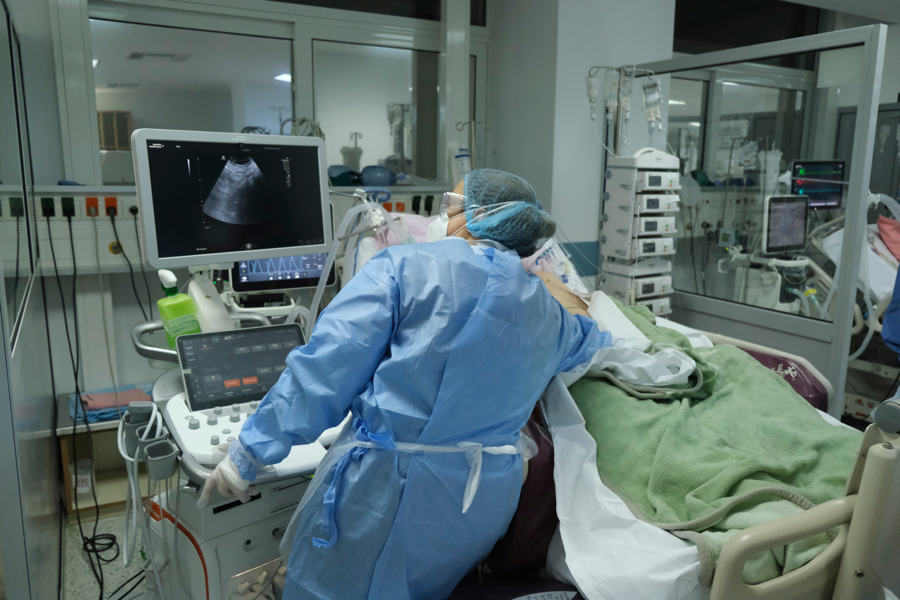
CAREER PATHS
The Rewarding Benefits of Working as an Operating Room Nurse
-
 EveryNurse Staff
EveryNurse Staff
- Last Updated: 08/24/2021

The operating room (OR) is a fast-paced and high-intensity specialty of nursing. Nurses in the OR work specifically with patients who are undergoing surgery. Depending on their skillset, they may circulate during the case or scrub into surgery. The technical skills that are required to work in the operating room are learned through on-the-job training.
Always One Patient at a Time
In the OR, the nurse to patient ratio is always one to one. Nurses are typically assigned to a specific OR for their shift and complete each case in the order they are scheduled. The Association of periOperative Registered Nurses (AORN) recommends having at least one nurse per surgical procedure along with scrub personnel— whether that additional role is filled by a scrub nurse or scrub technologist. This recommendation encourages patient safety by ensuring that the nurse is available to provide any supplies, instruments, or emergency assistance needed throughout the surgery. Caring for one patient at a time allows for complete focus with minimal distractions during the surgery.
Ideal Scheduling
Surgeries are typically scheduled and elective. This means that most surgeries occur during the day between 7:00 a.m. and 7:00 p.m. Therefore, this is a good specialty for nurses who don’t want to work evening or night shifts. Most surgeries are also scheduled during the week, resulting in a lighter weekend schedule. Many outpatient surgery centers are not open on weekends or holidays. Nurses who prefer overnight or evening shifts can pursue opportunities for those positions in hospital settings.
Exciting Surgeries
In addition to elective and scheduled surgeries, an emergent procedure may also be performed to save a patient’s life or limb. Caring for surgical patients can be distressing, as patients arrive at the hospital with traumatic injuries. These injuries may be the result of motor vehicle crashes, violence, falls, or clumsy accidents. An adrenaline rush often accompanies the thrill of working to save a life by treating equipment accidents, stabbings, or ruptured aneurysms.
Surgery can also be exciting because it presents clear views of anatomy. For instance, brain surgery under a microscope allows for a view of the pulsating brain tissues and vessels. Open abdominal surgery offers a chance to observe the majority of the organs, while open heart surgery shows the heart pumping rhythmically in the chest and the lungs filling with oxygen. Needless to say, surgery serves as a unique opportunity to examine the incredible ways that the body functions.
In large hospital settings, there are a greater number of nurses working in the OR than other units. Two staff members are typically assigned to each OR, with some hospitals staffing more than 25 ORs. This requires a higher amount of team members to accomplish surgical cases and relieve nurses for lunch breaks. A separate shift generally arrives mid-morning to offer breaks and cover the evening hours. This means that nurses are guaranteed a lunch break, which may not be the case in other units.
Knowledge of Surgical Cases
The technical knowledge required to work in the OR pertains to understanding the different surgical procedures. OR nurses are expected to master the steps of each procedure and anticipate the necessary equipment, instruments, and supplies. The amount of planning needed for each surgery varies, as some procedures are more complicated than others. Daily tasks in the OR are especially hands-on and it’s important for nurses to be confident in their ability to troubleshoot surgical equipment.
While not all nurses learn to scrub into surgery, those who do will enjoy the variety involved in the role. Scrubbing offers in-depth views of surgery and all of its complexities. Scrub nurses must learn the instrument names and which set they belong to, as well as how to efficiently pass instruments to the surgical team. Organizational skills and a strong eye for detail are key characteristics of each OR nurse. The ability to keep the sterile field neat and organized is a sign of an experienced and conscientious nurse.
Surgical specialty knowledge prevents OR nurses from being floated to other units during low surgical case census. Nurses without surgical experience cannot be floated into the OR. Typically, nurses are assigned to work in surgical specialties that they are most comfortable in and have the best working knowledge of. Some nurses prefer working in orthopedic or women’s health procedures. There are a variety of specialty options with a diverse set of benefits and challenges.
Increased Pay
The specialty knowledge required to work in the OR enables additional financial benefits. Surgical or procedure nurses can make a few more dollars per hour than they would in a floor nurse role. This can make a significant difference in income over the course of a year.
The need for after-hours coverage often leads to OR nurses being on-call. “Taking call” means that a nurse can be at home making money while waiting to be called in to cover an emergency procedure or staff shortage.
Teamwork and Camaraderie
- Circulating nurse
- Scrub personnel
- Nurse anesthetist or anesthesia physician assistant
- Anesthesiologist
- Surgeon
- Surgical assistant (Ex. Physician assistant, nurse practitioner, certified first assistant, or surgical resident)
- Ancillary staff members (Ex. Radiology technician, company sales vendor, medical students, or nursing students)
A team approach is critical during surgery to deliver successful patient outcomes and this cannot be accomplished without a full set of staff. Working together closely every day allows for strong friendships to form between the team. With everyone relying on each other to perform a smooth procedure, positive work relationships are bound to develop. In the case of particularly long procedures, conversations take place and jokes might be made if appropriate.
Many surgeons listen to music to break up the monotony of beeping surgical equipment or the sound of the suction machine. The intensity of the environment also contributes to the development of mutual trust between co-workers. The longer a team works together, the more fluid each surgery becomes with the additional advantage of building friendships along the way.
Takeaways
OR nursing is a thrilling specialty, offering the chance to form positive relationships and experience the tangible feeling of helping patients improve their quality of life. The hands-on technical capabilities of OR nurses allow for a safer and more patient-centered environment with a one-to-one ratio of nurse to patient. The opportunity to contribute to successful surgeries and receive higher pay are just a few more reasons why the OR is one of the best places to work.



















